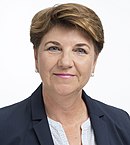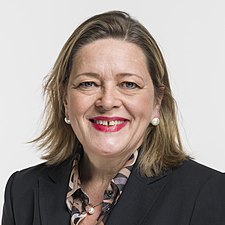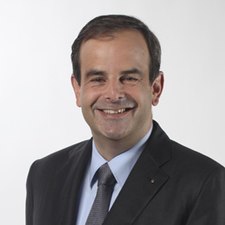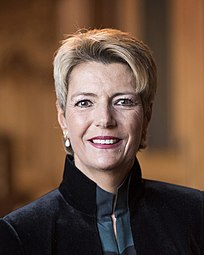
The government of Switzerland is a federal state with direct democracy.

The Federal Council is the federal cabinet of the Swiss Confederation. Its seven members also serve as the collective head of state and government of Switzerland. Since after World War II, the Federal Council is by convention a permanent grand coalition government composed of representatives of the country's major parties and language regions.
The Executive Council is the executive of the Swiss canton of Bern.
On December 12, 2007, all seven members of the Federal Council, the government of Switzerland, were elected by the joint chambers of the Federal Assembly for the 2008–2012 term of office. Councillors are elected individually by an absolute majority of votes, with the incumbent councillors defending their seats in descending order of seniority.

Eveline Widmer-Schlumpf is a Swiss politician and lawyer who served as a Member of the Swiss Federal Council from 2008 to 2015. A member of the Swiss People's Party (SVP/UDC) until 2008, she was then a member of the splinter Conservative Democratic Party (BDP/PBD) until 2021, when that party merged into The Centre. Widmer-Schlumpf was the head of the Federal Department of Justice and Police from 2008 to 2010, when she became head of the Federal Department of Finance. She served as President of the Swiss Confederation in 2012.
Two by-elections to the Swiss Federal Council were held in Switzerland on 22 September 2010, after federal councillors Moritz Leuenberger (SP) and Hans-Rudolf Merz announced they would step down from the Federal Council towards the end of the year. The by-elections resulted in the elections of Simonetta Sommaruga from the SP and Johann Schneider-Ammann from the FDP, resulting in no change in the partisan composition of the council. It also resulted in the first majority of women on the Federal Council in its history, with Sommaruga joining Micheline Calmy-Rey, Doris Leuthard and Eveline Widmer-Schlumpf.

Karin Keller-Sutter is a Swiss politician who is the current president of the Swiss Confederation and serves as a Member of the Swiss Federal Council since 2019. A member of FDP. The Liberals, she is the head of the Federal Department of Finance. Keller-Sutter previously served as President of the Council of States for the 2017–2018 term, and served as vice president of Switzerland for the 2024 term since 1 January.

Simonetta Myriam Sommaruga is a Swiss politician who served as a Member of the Swiss Federal Council from 2010 to 2022. A member of the Social Democratic Party (SP/PS), she was President of the Swiss Confederation in 2015 and 2020.

Johann Niklaus Schneider, known as Johann Schneider-Ammann, is a Swiss businessman and politician who served as a Member of the Swiss Federal Council from 2010 to 2018. A member of FDP. The Liberals, he was President of the Swiss Confederation in 2016. During his tenure as a federal councillor, Schneider-Ammann headed the Federal Department of Economic Affairs, Education and Research.
An election for all seven members of the Federal Council, the government of Switzerland, was held on 14 December 2011, following the federal election on 23 October 2011. Micheline Calmy-Rey announced she would not run for re-election to the council. According to a traditional informal convention, the successor has to come from the French-speaking or Italian-speaking part of Switzerland. The candidates for her post announced by their respective cantonal sections are Alain Berset (Fribourg), Pierre-Yves Maillard (Vaud), Stéphane Rossini (Valais), and Marina Carobbio (Ticino).
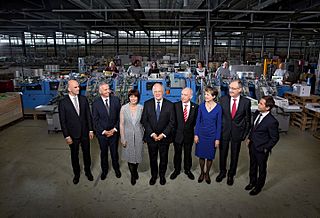
An election for all seven members of the Federal Council, the Government of Switzerland, was held on 9 December 2015, following the federal election on 19 October 2015, for the 2016–2020 term.

Viola Patricia Amherd is a Swiss politician who has served as a Member of the Swiss Federal Council since 2019, and as President of the Swiss Confederation for 2024 between 1 January and 31 December. She is the head of the Federal Department of Defence, Civil Protection and Sport. Amherd was a member of the Christian Democratic People's Party (CVP/PDC) before it merged with the Conservative Democratic Party (BDP/PBD) to form The Centre (DM/LC) in 2021, which she joined.
An election for all seven members of the Federal Council, the Government of Switzerland, was held on 11 December 2019, following the federal election on 20 October 2019, for the 2020–2024 term.

Elisabeth Schneider-Schneiter is a Swiss jurist and politician of The Centre.
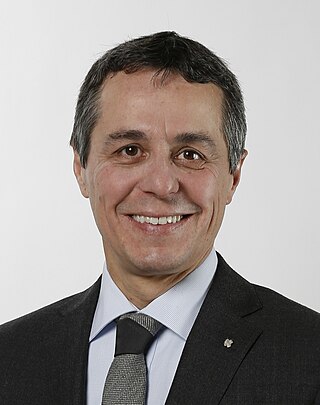
A by-election to the Swiss Federal Council was held on 20 September 2017, after federal councillor Didier Burkhalter (FDP-NE) announced he would leave the Council effective 31 October 2017. The by-election resulted in the election of Ignazio Cassis (FDP-TI), resulting in no change in the partisan composition of the council.

By-elections to the Swiss Federal Council were held on 7 December 2022, after federal councillors Ueli Maurer (SVP-ZH) and Simonetta Sommaruga (SP-BE) announced they would leave the Council effective 31 December of the same year. The parliament elected Albert Rösti and Élisabeth Baume-Schneider respectively to replace them.
An election for all seven members of the Federal Council, Switzerland's government, were held on 13 December 2023 for the 2024–2028 term. It followed the federal election held a month earlier and partly depended on its results.
By-elections to the Swiss Federal Council will be held on 12 March 2025, after federal councillor Viola Amherd (DM-VA) announced that she will leave the Council at the end of March of the same year. There had been rumour about her resignation for some time. The announcement overshadowed the main topic of her press conference on January 15, 2025: the reorganisation of compulsory service in the army and civil protection.

